|
|
|
Sort Order |
|
|
|
Items / Page
|
|
|
|
|
|
|
| Srl | Item |
| 1 |
ID:
142044


|
|
|
|
|
| Summary/Abstract |
Critiques of China’s ‘oil diplomacy’ center on its alleged disregard for transparency and human rights, yet such claims ignore that the problematic relationship between resource extraction and human rights precedes Chinese market entry. This article explores whether human rights implications are more serious for states exporting oil to China compared to another major oil importer, the United States. Contrary to the conventional wisdom, we argue that oil export dependence on the USA affects human rights more negatively than dependence on China because of differences related to the timing of market entry. The United States established stable relationships with oil supplier states decades ago, creating dependencies that are sufficiently long-term for the implications of the resource curse to take hold, and taking place before human rights became part of the US foreign policy agenda. In comparison, China’s late entry into global oil markets in the early 1990s meant that market access often required the provision of generous loan packages, which may help counteract the detrimental effects of oil dependence. Our empirical analysis examines the impact of oil export dependence on China versus the USA on human rights in supplier states for the 1992–2010 period. Results show that oil producing states dependent on exports to the USA exhibit lower human rights performance than those exporting to China. We also demonstrate that lower human rights performance for US exporters stems from long-term trends rather than short-term fluctuations in oil export dependence.
|
|
|
|
|
|
|
|
|
|
|
|
|
|
|
|
| 2 |
ID:
153660
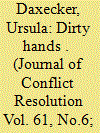

|
|
|
|
|
| Summary/Abstract |
Existing research suggests that the use of harsh repression can exacerbate the incidence and duration of terrorism. Micro- and macro-level analyses have shown that coercive government responses to terrorism can radicalize sympathizers, increase recruitment, and undermine community support for counterterrorism policies, leading to backlash and increased terrorist activity. Focusing on torture techniques, this article aims to establish mechanisms implicit in the backlash hypothesis. These arguments imply that information about government transgressions is available to potential group sympathizers, but have not examined whether and how variation in the visibility of different torture techniques affects the likelihood of backlash. Scarring torture, a technique that is both more visible and less plausibly deniable than other forms of torture, is expected to produce higher volumes of terrorism. Using disaggregated data on allegations of torture from the Ill-Treatment and Torture project for 1995 to 2005, the analysis shows that scarring torture is consistently associated with increases in terrorism, whereas stealth torture has no statistically discernable effect on terrorism.
|
|
|
|
|
|
|
|
|
|
|
|
|
|
|
|
| 3 |
ID:
167292
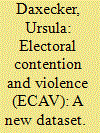

|
|
|
|
|
| Summary/Abstract |
Recent elections in Afghanistan, Bangladesh, Côte d’Ivoire, Egypt, Iraq, Kenya, Nigeria, and Pakistan have displayed substantial contestation and violence. A growing literature explores the causes and consequences of electoral contention and violence, but researchers lack comprehensive, disaggregated data establishing a substantive link between elections and violence. The Electoral Contention and Violence (ECAV) dataset conceptualizes electoral contention as nonviolent or violent events of contestation by state or non-state actors related to national elections. The data contain more than 18,000 events of election-related contention covering 136 countries holding competitive national elections between 1990 and 2012. This article describes the scope of ECAV, presents the project’s definition of electoral contention and the variables included, and outlines the coding procedure. We then compare ECAV to other datasets on electoral contention. Cross-national and subnational analyses of electoral competition and violence show that the data are useful for assessing the global and subnational implications of existing theories. ECAV addresses current data limitations by focusing on election-related contention, by using clear criteria to determine whether events are election-related, and by identifying the timing, geocoded location, and actors involved.
|
|
|
|
|
|
|
|
|
|
|
|
|
|
|
|
| 4 |
ID:
152299
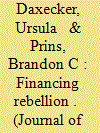

|
|
|
|
|
| Summary/Abstract |
A prominent explanation of the resource–conflict relationship suggests that natural resources finance rebellion by permitting rebel leaders the opportunity to purchase weapons, fighters, and local support. The bunkering of oil in the Niger Delta by quasi-criminal syndicates is an example of how the black-market selling of stolen oil may help finance anti-state groups. More systematic assessments have also shown that the risk and duration of conflict increases in the proximity of oil and diamond deposits. Yet despite the emphasis on rebel resource extraction in these arguments, empirical assessments rely almost exclusively on latent resource availability rather than actual resource extraction. Focusing on maritime piracy, this article argues that piracy is a funding strategy neglected in current research. Anecdotal evidence connects piracy in the Greater Gulf of Aden to arms trafficking, the drug trade, and human slavery. The revenue from attacks may find its way to Al-Shabaab. In Nigeria, increasing attacks against oil transports may signal an effort by insurgents to use the profits from piracy as an additional revenue stream to fund their campaign against the Nigerian government. The article hypothesizes that piracy incidents, that is, actual acts of looting, increase the intensity of civil conflict. Using inferential statistics and predictive assessments, our evidence from conflicts in coastal African and Southeast Asian states from 1993 to 2010 shows that maritime piracy increases conflict intensity, and that the inclusion of dynamic factors helps improve the predictive performance of empirical models of conflict events in in-sample and out-of-sample forecasts.
|
|
|
|
|
|
|
|
|
|
|
|
|
|
|
|
| 5 |
ID:
169073
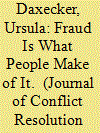

|
|
|
|
|
| Summary/Abstract |
Why do fraudulent elections encourage protesting? Scholars suggest that information about fraud shapes individuals’ beliefs and propensity to protest. Yet these accounts neglect the complexity of opinion formation and have not been tested at the individual level. We distinguish between the mobilizing effects of actual incidents of election fraud and individuals’ subjective perceptions of fraud. While rational updating models would imply that both measures similarly affect mobilization, we argue that subjective fraud perceptions are more consistent predictors of protesting, also being shaped by attitudes, information, and community networks. Our empirical analysis uses geo-referenced individual-level data on fraud events, fraud perception, and protesting from the 2007 Nigerian elections. Our analysis yields two main findings: proximity to reported fraud has no effect on protesting and citizens perceiving elections as fraudulent are consistently more likely to protest, and more so if embedded in community networks.
|
|
|
|
|
|
|
|
|
|
|
|
|
|
|
|
| 6 |
ID:
125105
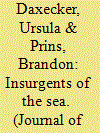

|
|
|
|
|
| Publication |
2013.
|
| Summary/Abstract |
While piracy may evoke romanticized visions of swashbuckling, rum swigging, and skirt chasing pirates hoisting the Jolly Roger, maritime piracy has changed substantially by taking advantage of modernization and substantial upgrading of the weapons, vessels, and weapons it employs. In addition, as documented by the International Maritime Bureau (IMB), the frequency of pirate attacks has increased significantly, with more than 2,600 piracy incidents occurring since 2004. The authors argue that piracy is a result of permissive institutional environments and the lack of legal forms of employment in states' fishing sectors. The authors investigate these arguments empirically using data for all countries with coastlines in the 1995-2007 period. The empirical analyses show that state weakness and reductions in fisheries production values affect piracy as expected. These findings suggest that international efforts in combating piracy should center on improving the institutional environments and labor opportunities driving maritime piracy.
|
|
|
|
|
|
|
|
|
|
|
|
|
|
|
|
| 7 |
ID:
170811
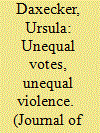

|
|
|
|
|
| Summary/Abstract |
Elections held outside of advanced, industrialized democracies can turn violent because elites use coercion to demobilize political opponents. The literature has established that closely contested elections are associated with more violence. I depart from this emphasis on competitiveness by highlighting how institutional biases in electoral systems, in particular uneven apportionment, affect incentives for violence. Malapportionment refers to a discrepancy between the share of legislative seats and the share of population, violating the ‘one person, one vote’ principle. Drawing on recent work on malapportionment establishing that overrepresented districts are targeted with clientelist strategies, are more homogenous, and are biased in favor of district-level incumbent parties, I argue that overrepresented districts present fewer incentives for using violence. In contrast, elites in well-apportioned or underrepresented districts exert less control over electoral outcomes because such districts have more heterogenous voter preferences, raising incumbent and opposition demands to employ violence. I examine the effects of malapportionment on violence using constituency-level elections data and new, disaggregated, and geocoded event data on the incidence of election violence in India. Results from six parliamentary elections from 1991 to 2009 show that electoral violence is less prevalent in overrepresented constituencies, and that violence increases in equally apportioned and moderately underrepresented districts. The analysis establishes additional observable implications of the argument for district voter homogeneity and incumbent victory, accounts for confounders such as urbanization and state-level partisanship, and validates measures of election violence. The findings illustrate that institutional biases shape incentives for electoral violence.
|
|
|
|
|
|
|
|
|
|
|
|
|
|
|
|
|
|
|
|
|